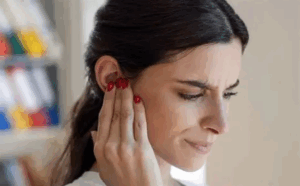
Happy New Year! Diet and Exercise are the most common New Year’s resolutions. What is the relationship between diet, exercise, and tinnitus management? Recent research suggests diet and exercise has a positive impact in dealing with chronic tinnitus. Tinnitus, the perception of phantom sound in the head or ears, is a common symptom experienced by 50 million Americans. “Tinnitus can be perceived as an alarming and bothersome percept; let it be an alarm, rather, a wake-up call to start leading a healthier life and taking care of yourself.”, said Christopher Spankovich, Ph.D., an associate professor and vice chair of research for the Department of Otolaryngology and Communicative Sciences at the University of Mississippi Medical Center.
Regular exercise helps decrease tinnitus disturbance in the following ways:
- Exercise reduces stress hormones and increases the release of endorphins, causing a person to feel better physically and mentally.
- Physical activity improves sleep and restfulness helps our bodies to be calmer.
- The best exercise is doing something you really enjoy consistently.
- If you enjoy something, you are more likely to repeat it.
- Studies have shown short but consistent exercises are more beneficial than exercising for long duration inconsistently.
- Recent research published in Ear and Hearing (2020) by Dawes et al suggests a link between certain dietary changes and odds of tinnitus and hearing health.
- According to their study, higher intake of vitamin B12 and protein was associated with reduced odds of tinnitus, while higher intakes of calcium, iron, and fat were associated with increased odds.
- Findings from several studies published between 2010 to 2018 did not find a consensus between amount of caffeine intake and severity of tinnitus.
- Three of the studies found no association between tinnitus and caffeine consumption. However, most studies agreed some patients might benefit from caffeine consumption reduction and side effects of sudden caffeine withdrawal (headaches and nausea) might add to the burden of existing tinnitus.
- There are anecdotal evidence for certain foods to trigger increases in tinnitus awareness, such as salt and alcohol.
Spankovich et al (2017) examined the relationship between the Healthy Eating Index (HEI) and reports of tinnitus. The HEI is a measure of how well a diet confirms to the recommended dietary guidelines of the U.S. Department of Agriculture (USDA). Their findings revealed decreased odds of persistent tinnitus with healthier diet (higher HEI), controlling for factors such as age, gender, race, noise exposure, diabetes, and smoking status. A healthy diet consists of whole grains, fruits and vegetables, good sources of fat such as fish, nuts, and seeds, lean protein such as chicken and turkey, and less red meat. The American Heart Association recommends Eat More Color!
In addition to managing tinnitus, exercising and eating a healthy diet can improve overall health and well-being, improve sleep, and reduce anxiety. We recommend our patients to consult their primary care physician when making dietary changes. Try to be more active but do what is within your ability.
Call to schedule an appointment. We look forward to helping you hear better!



